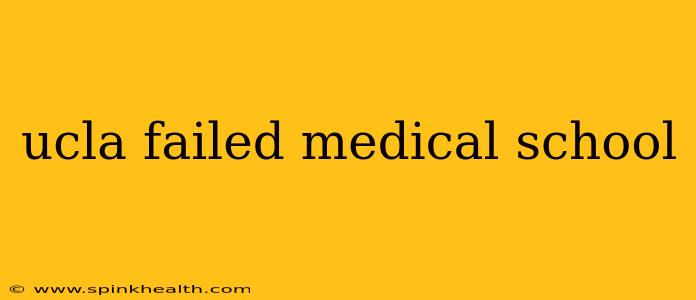The UCLA Medical School Rejection: A Story of Resilience and New Beginnings
The email arrived, a stark white rectangle against the vibrant blue of my phone screen. "We regret to inform you..." The words swam before my eyes, blurring the carefully constructed future I'd envisioned for myself at UCLA's prestigious medical school. My dream, years of relentless studying, late nights fueled by caffeine and sheer determination, seemed to crumble in my grasp. I'd failed. Or rather, UCLA hadn't chosen me.
The initial shock morphed into a rollercoaster of emotions. Disappointment, anger, self-doubt – they all crashed over me in a tidal wave. I questioned everything: my abilities, my choices, my worth. The weight of expectation, both self-imposed and external, pressed down heavily. My friends and family, while supportive, couldn't fully understand the depth of my despair. This wasn't just a setback; it felt like a complete derailment of my life's trajectory.
Why did I get rejected from UCLA Medical School?
This is the question that haunted me. The application process is notoriously competitive, and UCLA receives thousands of applications from incredibly qualified candidates. While they don't provide specific reasons for rejections, common factors include:
- Low GPA or MCAT scores: While I won't disclose my exact scores, I know they could have been stronger. The relentless pressure to achieve perfection had taken its toll, leading to burnout and potentially impacting my performance.
- Weak letters of recommendation: Building strong relationships with professors and mentors is crucial. I realize now I could have sought more meaningful interactions and feedback to strengthen my application.
- Unimpressive personal statement: This is where you showcase your passion, experiences, and motivations. My personal statement, while heartfelt, could have been more compelling and better structured. I lacked a concise narrative that truly captured my essence and aspirations.
- Lack of significant extracurricular activities or research experience: Demonstrating a commitment to medicine beyond academics is vital. I focused heavily on academics, neglecting the importance of well-rounded experiences that could have showcased my unique skills and qualities.
What are my options after being rejected from medical school?
The initial despair slowly gave way to a different kind of energy – a resolve to find a path forward. I wasn’t going to let this rejection define me. My options, thankfully, weren't limited.
- Reapply: Many rejected applicants successfully gain admission after reapplying, often after strengthening their application. This means focusing on those areas where I fell short – improving my MCAT score, seeking stronger letters of recommendation, and crafting a more impactful personal statement.
- Explore other medical schools: The UCLA rejection didn't invalidate my capabilities; it just meant that UCLA wasn't the right fit. Applying to other schools with different admission criteria is a wise option.
- Take a gap year: This time could be used for further academic enrichment, gaining research experience, or volunteering in a healthcare setting – all of which can strengthen a future application.
- Consider alternative healthcare paths: Rejection from medical school doesn't necessarily mean the end of a healthcare career. There are numerous other fulfilling career paths within the healthcare field such as physician assistant, nursing, or medical research.
How can I improve my chances of getting into medical school next time?
This experience has been a harsh but valuable teacher. I’ve identified my weaknesses and am actively working on strengthening them. This includes:
- Improving my MCAT score: I've enrolled in a dedicated MCAT prep course and am working diligently to improve my score.
- Seeking stronger letters of recommendation: I'm nurturing relationships with professors and mentors, seeking constructive feedback and ensuring they fully understand my aspirations.
- Crafting a compelling personal statement: I’m working with a writing coach to refine my narrative, showcasing my unique strengths and experiences effectively.
- Gaining relevant experience: I’ve started volunteering at a local hospital and am pursuing research opportunities to broaden my experience.
The UCLA rejection was devastating, but it wasn't the end of my journey. It's a chapter, a turning point that’s forcing me to become stronger, more resilient, and more focused. It has taught me the importance of perseverance, self-reflection, and adaptability. I am reapplying, and this time, I’m confident I’ll be better prepared, more determined, and closer to achieving my dream. The path might be winding, but I’m embracing the journey.

